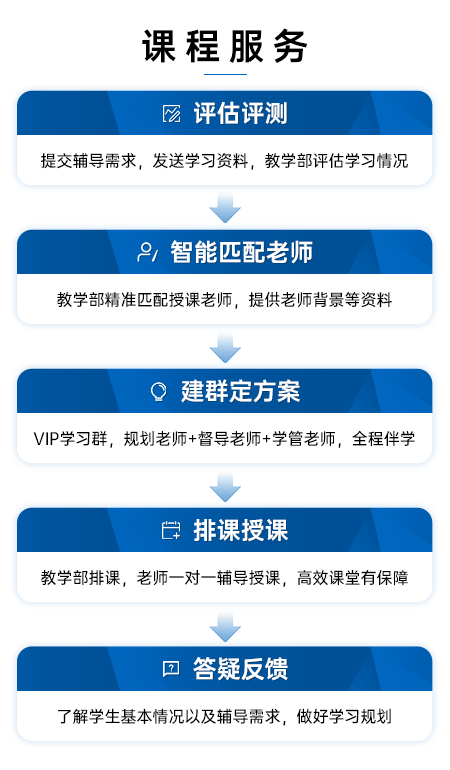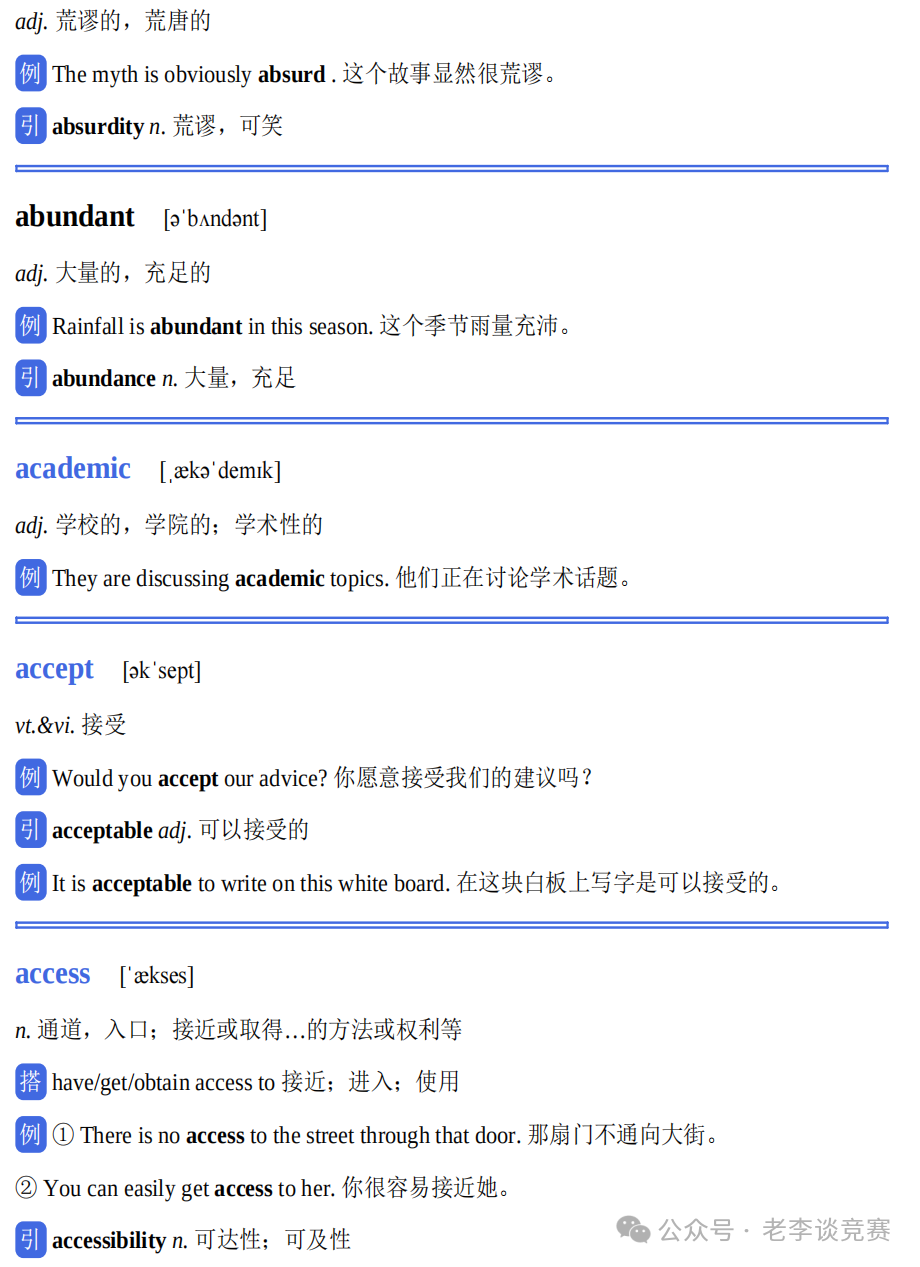KET考试的Paper1同时包含了写作与阅读两个部分,整个考试时长为60分钟。根据剑桥官方的建议,考生应将40分钟用于阅读部分,而留给写作的则是20分钟。在这宝贵的20分钟里,考生需要完成Part6和Part7的两篇作文,时间相当紧凑。
写作部分主要考察的是考生用英语进行语言表达的能力,而要想写出高水平的语言,离不开平时高质量的语言素材积累。因此,想要在考试中既按时完成两篇作文,又取得满意的分数,考生必须在日常学习中加强对词汇和句型的积累。
老师研究了剑桥KET考试历年真题中考官打出高分的写作范文,以及剑桥ET考试官方备考资料中的高分范文,今天给大家总结了在Part6和Part7高分作文中的常用句型,以帮助我们更精准、高效地积累写作句型,一起来看看吧。
短消息写作高频句型
希望大家结合例句将这些Part6中的高频句型都牢牢记住。它们都不难,但是在短消息写作中很常用。
另外,请特别注意这些句子在短消息写作中通常是用在文章的什么位置句型
句型1.I'm writing to...我写信是想/要……
例句:I'm writing to thank you for your help yesterday.
我写信是想谢谢你昨天帮了我。
I'm writing to tell you some good news.
我写信是想告诉你一些好消息。
详解:这个句型通常作为一则短消息的首句,开门见山地告诉对方写信的目的。
近义句型:Imwiting toyou because...
我写信给你是因为……:
I'm writing to you because I want to tell you some good news.
我写信给你是因为想告诉你一些好消息。
句型2.It’sgoodto do sth.很高兴做某事/做某事有好处
例句:It's good to hear from you.
很高兴收到你的来信。
It's good to do morning exercise every day.
每天晨练有好处。
详解:It's good to hear from you.
这句话可以在回复一封邮件的时候用作首句,使得语气更加礼貌。类似的句型还有:
Thanks for your email/news/notice/message.
谢谢你的邮件/消息/通知/信息。
句型3.I’msorry to hear about...听到……我很难过
例句:I'm sorry to hear about your illness.
听说你生病了,我很难过。
I'm sorry to hear about the bad news.
听到这个坏消息,我很难过。
详解:这个句型用来回复坏消息,写在回复邮件的开头或者正文中都可以。还可以用’m sorr后面接一个从句,表达相同的意思,如:y to hear that...
I'm sorry to hear that you are ill.
听说你生病了,我很难过。
句型4I'msorry,but...很抱歉,但是……
例句:I'msorry,butIcan'tgo to the library on Sunday.
很抱歉,但是我周日不能去图书馆了。
I'm sorry, but I won't be able to come tonight.
很抱歉,但是我今天晚上来不了了。
详解:这个句型多用于邮件首句。如果想要婉拒对方的请求,或者告知对方自己无法做某事,使用这个句型可以使语气更加礼貌。
近义句型:I'm afraid (that)... 我恐怕……
例句:I'm afraid (that) I can't go to your birthday party.
我恐怕没法去参加你的生日聚会了。
句型5Would you like to...? 你想……吗?
例句:Would you like to come with us?
你想跟我们一起来吗?
Would you like to take part in the competition?
你想要参加这个竞赛吗?
详解:这个句型用来询问对方的想法,语气比Do you want to...? 更委婉一些。
近义句型:Would you like me to...? 你想要我……吗?
例句:Would you like me to go there with you?
你想要我和你一起去那里吗?
句型6.I could...if you like. 如果你愿意的话,我可以……
例句:I could give you a lift if you like.
如果你愿意的话,我可以顺便载你一程。
I could help you with your luggage if you like.
如果你愿意的话,我可以帮你提行李。
详解:这个句型用来向对方提出帮助。could在这里只是使语气上更委婉,不表示过去时。
近义句型:I can...if you want. 如果你需要的话,我可以……
例句:I can wait for you if you want.
如果你需要的话,我可以等你。
句型7.Why don't we/you...? 我们/你/你们为什么不……?
例句:Why don't we meet at the school gate and go there together?
我们为什么不在学校门口碰头,然后一起去那里呢?
Why don't you attend the lecture this Saturday?
你为什么不这周六去参加这个讲座呢?
详解:这个句型用来提出建议,表面上使用的是疑问句和否定句,实际表达的却是一种肯定的建议。
近义句型:How/What about...? ……怎么样?Let's... 让我们……
例句:How/What about playing football tomorrow?
明天踢足球怎么样?
Let's meet at 8 o'clock outside the park.
我们8点在公园外面碰头吧。
句型8.Is it OK if I...? 我可以……吗?
例句:Is it OK if I borrow your notebook?
我可以借一下你的笔记本吗?
Is it OK if I invite one of my good friends to the party?
我可以邀请我的一个好朋友来参加这个聚会吗?
详解:这个句型用来提出请求。我们也可以直接说出自己的想法,然后再加上一个简短的问句来向对方提出请求,例如:
I want to borrow your notebook. Is it OK?
我想借一下你的笔记本,可以吗?
I want to invite one of my good friends to the party. Is that OK?
我想邀请我的一个好朋友来参加这个聚会,可以吗?
句型9.Don't forget... 别忘了……
例句:Don't forget to bring your student card.
别忘了带上你的学生证。
Don't forget your umbrella.
别忘了你的伞。
详解:这个句型简单明了,通常用作短消息的最后一句,用来提醒对方不要忘记某事或某物。
句型10.I look forward to... 我期待……
例句:I look forward to hearing from you.
我期待收到你的来信。
I look forward to seeing you soon.
我期待很快见到你。
详解:这个句型用于邮件末尾。look forward to后面可以直接接名词或名词短语,但是如果是接动词,则必须要用动名词形式。这个句型也经常跟as soon as possible搭配,如:
I look forward to hearing from you as soon as possible.
我期待尽快收到你的来信。
短篇故事写作高频句型
下面这些句型我们在写短篇故事的时候经常会用到,大家还是结合对应的例句来学习,并且注意这些句型在短篇故事写作中是如何运用的。短篇故事写作要求至少35词,如果能熟练掌握这些常用句型,那么达到考试要求的写作词数对我们来说就没有什么难度了。
注意:由于在短篇故事写作中主要是使用一般过去时或者过去进行时来描述图中的内容,所以在以下的句型和例句中都直接使用了过去时态。
句型1.It was... 那(天)是……
例句:It was Sunday morning.
那是周日上午。
It was a rainy Saturday afternoon.
那是个下着雨的周六下午。
详解:It was... 这个句型是不是特别简单?大家别看它简单,它可是非常实用的,基本在每一个短篇故事的开头,都可以用它来介绍故事发生的时间或当时的天气。
句型2.There was/were... 有……
例句:There was nothing left in the fridge.
冰箱里什么都没有了。
There were so many people in the park.
公园里有很多人。
详解:There be句型表示“存在;有”这个概念,大家不要将它跟have的用法弄混。我们经常用There was/were... 来描述图中有什么人或什么东西。
句型3.so...that... 如此……以至于……
例句:The film was so interesting that they enjoyed it very much.
那部电影太有意思了,他们都非常喜欢。
Jack was so happy that he gave his father a big hug.
杰克太开心了,他给了爸爸一个大大的拥抱。
详解:so后面可以接形容词或副词,that后面接一个完整的句子。我们在描述图中的细节或者人物的感受时,常会用到这个句型。
句型4.It was...for sb. to do sth. 对某人来说做某事……
例句:It was dangerous for children to play football in the street.
对孩子们来说在街上踢足球很危险。
It was too difficult for him to understand this novel.
这部小说对他来说太难理解了。
详解:在这个句型中,省略号的位置要用形容词。
句型5.It took sb. some time to do sth. 做某事花了某人多长时间
例句:It took Rachel about two hours to finish the housework.
蕾切尔花了差不多两个小时才做完家务活。
It took them half an hour to find the wallet.
他们花了半个小时才找到钱包。
详解:这个句型用来描述图中的人物花了多长时间做了什么事情。
句型6...passed before... 过了(一段时间)才(发生某事)
例句:Two hours passed before the heavy rain stopped.
两个小时过后,这场大雨才停。
More than half an hour passed before the bus came.
半个多小时过去了,公交车才来。
详解:描述故事时经常要用到时间状语,这个句型表达的意思与after很接近,但是还包含了一种“才”的意思在里面,语气更强烈。
句型7.What...! 多么……!
例句:What a nice weekend (it was)!
这是多棒的一个周末啊!
What interesting films (they were)!
这些电影真有意思啊!
详解:What引导的感叹句:“What+a/an+(形容词)+单数可数名词+主语+谓语!”或“What+(形容词)+可数名词复数/不可数名词+主语+谓语!”
这个句型中的主语和谓语可以省略,在短篇故事写作中通常用在文末,表达一种感叹。
近义句型:“How+形容词/副词+主语+谓语!”(主语和谓语可以省略)
例句:How nice (the weekend was)!
这是多棒的一个周末啊!
How interesting (these films were)!
这些电影真有意思啊!
句型8.To one's... 让某人……的是
例句:To their disappointment, the gym was closed.
让他们失望的是,健身房关门了。
To our surprise, there were a lot of nice presents in the box.
让我们惊讶的是,盒子里有很多漂亮的礼物。
详解:to one's后面接表示情感的名词,例如:to one's shock(让某人吃惊的是),to one's joy(让某人高兴的是),to one's excitement(让某人兴奋的是)。
句型9.sb. spent (time) doing sth. 某人花了多长时间做某事
例句:Jimmy spent hours watching TV at home.
吉米一连几个小时在家看电视。
I spent the whole day writing postcards.
我整整写了一天的明信片。
详解:spend这个动词的过去式和过去分词是不规则变化,均为spent。spend的主语必须是人,不能是事或物。
句型10.asked (sb.) for sth. (向某人)要某物
例句:He asked me for a pen and a piece of paper.
他找我要了一支笔和一张纸。
I asked Bessie for help.
我向贝茜寻求帮助。
详解:ask表示“问”,ask a question表示“问一个问题”;但是ask for表示“要”,比如:ask for some money 意为“要一些钱”。
高频句型综合练习
请写出下列句子对应的英文,记得使用本章学过的句型哦。
1. 我恐怕没办法准时到达机场了。
_______________________________________________________________________
2. 那是一个下着雪的周一上午。
_______________________________________________________________________
3. 如果你愿意的话,我可以帮你预订两张票。
_______________________________________________________________________
4. 这部电影真糟糕!
_______________________________________________________________________
5. 我期待早日收到你的来信。
_______________________________________________________________________
6. 他们花了一个多小时来清理花园里的积雪。
_______________________________________________________________________
7. 我可以在学校礼堂等你吗?
_______________________________________________________________________
8. 买一个这么贵的礼物对她来说是不可能的。
_______________________________________________________________________
9. 加入小提琴俱乐部是件好事。
_______________________________________________________________________
10. 书店里有很多有意思的新书。
_______________________________________________________________________
11. 你为什么不明天打包行李呢?
_______________________________________________________________________
12. 他们花了一整天的时间来做作业。
_______________________________________________________________________
13. 我写信给你是要告诉你,我刚刚搬到了一个新的城市。
_______________________________________________________________________
14. 让他们吃惊的是,房间里一团糟。
_______________________________________________________________________
15. 听说你们输了那场足球赛,我很难过。
_______________________________________________________________________
16. 彼得向服务员要了一份菜单。
_______________________________________________________________________
17. 我们在校门口见吧。
_______________________________________________________________________
18. 过了差不多一个小时,他们才找到汽车钥匙。
_______________________________________________________________________
19. 你想要我和你一起去听音乐会吗?
_______________________________________________________________________
20. 森林里的景色太美了,他们玩得非常开心。
_______________________________________________________________________
练习答案
1. I'm afraid (that)I can't arrive at the airport on time.
2. It wasa snowy Monday morning.
3. I couldbook two tickets for you if you like
4. Whata terrible film (it was)! (or: Howterrible the film was!)
5. Ilook forward tohearing from you soon / as soon as possible.
6. It tookthem more than one hour toclean the snow in the garden.
(or: They spentmore than one hour cleaningthe snow in the garden.)
7. Is it OK ifI wait for you at the school hall?
(or: I'll wait for you at the school hall. Is it OK?)
8. It was/isimpossible forher tobuy such an expensive present.
9. It's good tojoin the violin club.
10. There were/aremany interesting new books in the bookstore.
11. Why don't youpack your luggage tomorrow?
12. They spentthe whole day doingtheir homework.
(or: It tookthem the whole day todo their homework.)
13. I'm writing totell you that I've just moved to a new city.
14. To their shock,the room was in a mess.
15. I'm sorry to hear thatyou lost/have lost the football match.
16. Peter askedthe waiter fora menu.
17. Let'smeet at the school gate.
18. Nearly one hour passed beforethey found the car key.
19. Would you like me togo to the concert with you?
20. The scenery in the forest was sobeautiful thatthey had a good time.
以上仅为KET写作高频句型小部分展示。














